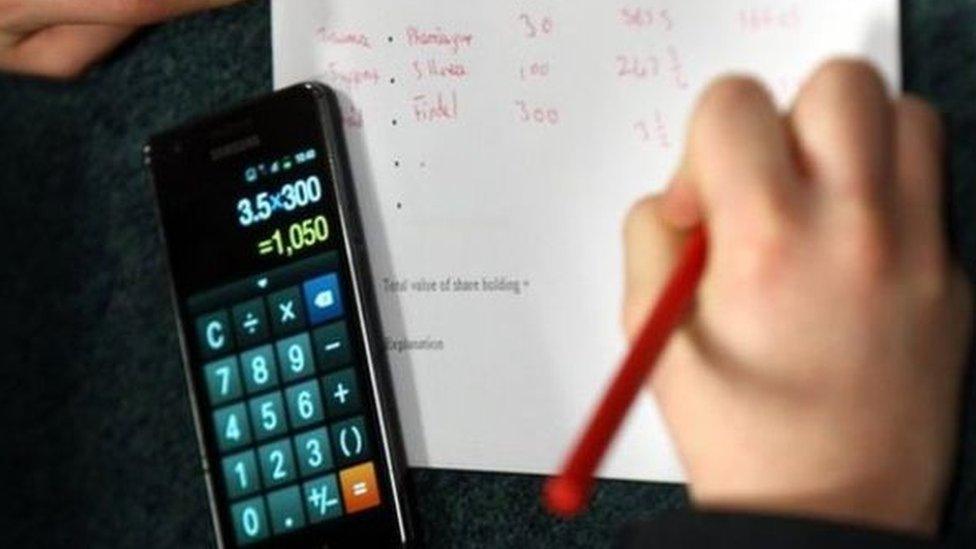New maths GCSE proposed for those in cycle of resits
- Published

A new maths GCSE should be introduced for those students in England stuck in a cycle of resitting maths to achieve a grade 4 or above, a charity says.
The proposed new curriculum should focus on "the maths needed for everyday life and work", Mathematics in Education and Industry says.
The charity says the new exam should be for post-16 students only and carry the same status as the current maths GCSE.
The government said other courses were available for these students.
MEI says the new course, external would be the same level as the foundation tier of the current maths GCSE, giving students the chance to achieve a grade 4 or 5.
"Possible titles include GCSE core maths or GCSE numeracy," it says.
The qualification would require three exams:
a one-hour paper early in the course
two one-and-a-half-hour papers at the end of the course
Examples of the sorts of areas that would be covered include:
understanding discounts in the sales
splitting a restaurant bill
using shapes in designing a garden or craft project
buying enough paint to decorate a room
understanding timetables
understanding a map or scale drawing
making sense of statistics in the news
understanding statistics relating to personal fitness and health
Current government policy in England means students aged 16 to 18 who have not achieved a grade 4 or above in maths must continue studying the subject.
In the summer of 2019, nearly 180,000 students resat maths but only 22.3% of them achieved a grade 4 or better.
"Much effort and money is being spent on a system that gives many young people a negative experience of mathematics education that is detrimental to them as individuals and to our society as a whole," the MEI report, funded by the Nuffield Foundation. says.

MEI chief executive Charlie Stripp, said their suggested maths GCSE curriculum "paved the way" for policy to be changed.
"It has been clear for years that the current resit policy is not fit for purpose for young people who do not succeed in maths at age 16," he said.
"These young people deserve better."
"They need a different maths GCSE curriculum - one that better reflects their status as young adults and which they can see is relevant to the maths they need for their future life and employment."
A Department for Education spokeswoman said: "We know students who leave school with a good grasp of maths increase their chances of securing a job or going on to further education.
"However, we recognise the challenges faced by some students who have to retake their maths GCSE.
"Students who achieve a grade 2 or below have the opportunity to instead take functional skills, an alternative qualification providing maths for everyday life and work."
Association of Colleges chief executive David Hughes said the vast majority of post-16 GCSE maths retakes were taken in colleges.
"A dedicated post-16 maths GCSE for these students, with equivalent grades to the current GCSE would be welcomed by colleges and employers.
"Most importantly I am sure that students would find it more appropriate for their progression.
"The proposed curriculum would better engage and motivate students who achieved grade 3 or below at 16 by incorporating a stepping-stone assessment of basic maths skills worth 20% that can be taken before the final exam and which has some value in its own right."